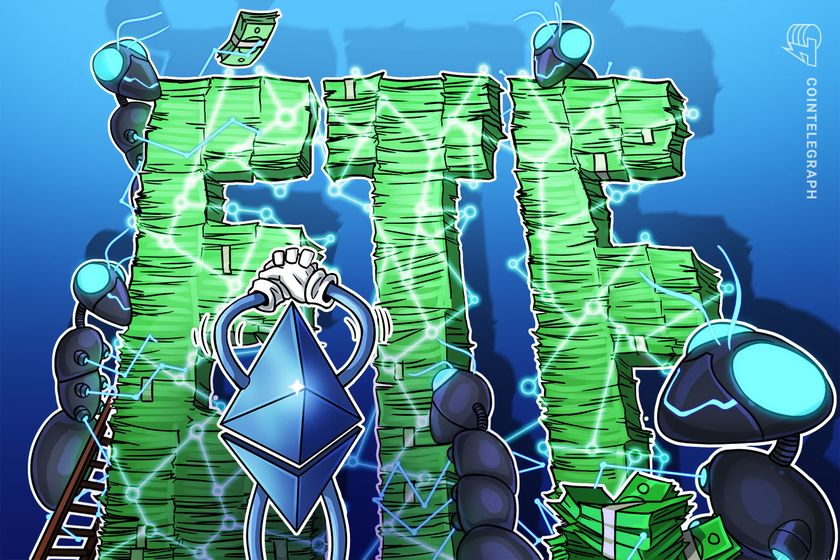Law Decoded: Loose ends and long dramas, Feb. 19–26

Longstanding sagas in crypto saw major plot development and even a conclusion or two in this week’s newsletter.
Every Friday, Law Decoded delivers analysis on the week’s critical stories in the realms of policy, regulation and law.
Editor’s note
One day in the not-so-distant future, the curious experience of episodic television with its week-by-week gaps will be a weird thing that old people strain themselves not to talk about around the youths, until they eventually get, like, really old and stop caring and start turning all of the logistical inconveniences of their early memories into little moral parables. And by “they,” I mean me. And I’m looking forward to it.
It’s possible that entertainment’s on-demand, all-the-time availability is a pipeline to an obsession with news (and maybe professional sports). They are the last stories that make us wait. Where else do you find a cliffhanger these days?
For example, today is also the day that we learn that the person the world assumed to have ordered the torture and death of Jamal Khashoggi in fact did order the torture and death of Jamal Khashoggi.
The big policy stories in crypto this week are also long-anticipated events, must-see episodes to drawn-out dramas. And though, after a while, all big events start to look linked, crypto has seen a set of especially fascinating plot points reaching conclusions.
Coinbase sets out for public listing
It’s been one of the most hotly discussed prospective events in crypto for years: Coinbase, the giant of U.S. crypto exchanges, goes public.
An S-1 form, also known as an initial registration, filed with the SEC yesterday is a major step in that journey. It’s the first proper public disclosure a company makes in advance of public trading.
Consequently, a venn diagram of separate but linked worlds — crypto, tech and Wall Street — has been crowding together to pour over info about Coinbase that is available publicly for the first time. We all knew the company was big, but how big?
Quite big. Founder and CEO Brian Armstrong raked in a cool $60 million last year. Revenue topped $1.1 billion last year. And, based on the backstage scurrying of private shares, it’s set to hit a valuation of just over $100 billion, which would make it the biggest tech IPO to hit American markets ever, a record that Facebook currently holds. Sort of.
Here begins the speculation. We’re seeing a retracing in crypto markets following record surges that were synchronous with a massive inflow of revenue to Coinbase at the end of last year. What if this is a long-term retraction? Coinbase’s net valuations have shifted wildly, and it’s pretty clear that it’s heavily tied to crypto markets in general, and Bitcoin’s price in particular. The specific qualities of its ever-finicky trading platform? Not so much. More extreme: What if Coinbase puts its public vehicles back up on the blocks?
While the company hasn’t publicized a date for its IPO yet, it really does seem past the point of no return. As for its valuation and BTC price, there’s little doubt that a public Coinbase will serve as some sort of barometer for public interest in crypto, which really does correlate to bull markets. So while radical shifts in valuation both before and after the IPO are likely, that’s hardly new to anyone used to holding crypto.
The tale of BitFinex, Tether, and the New York Attorney General
To spoil the ending: No, they did not live happily ever after.
That is, despite the groundswell of crypto public opinion calling the recent settlement between the IFinex clan and the New York regulator an exoneration, a repudiation of longstanding accusations that Tether printed stablecoins without having reserves of dollars, because those reserves were off solving BitFinex’s capital problems. It’s a settlement, and, despite being bearable, a pretty expensive one. The agreement not to press criminal charges is, however, a license to live.
Effectively, the Attorney General has banished the IFinex family that houses Tether and BitFinex, run by the maybe-fictional Jan Ludovicus van der Velde, from New York. The AG also maintained that the reserves that were supposed to be here, on-hand, were in fact way over there, offshore and inaccessible. Per the AG, Tether was unbacked or underbacked for the bulk of the 2017 bull run.
IFinex managed to avoid admitting guilt as part of the settlement, but that’s a far cry from being innocent. The optimism we see from the crypto industry is likely a sigh of relief that IFinex is not likely to capitulate, an event that would ultimately be catastrophic for all corners of the crypto industry. Tether daily volumes continue to dwarf all others, as it is the preferred medium of transaction to or from all other crypto currencies on exchanges all over the world.
It will be interesting what sort of impact this settlement has on the huge class action market manipulation suit in Manhattan, which is gunning for Tether’s largesse by claiming it manipulated the market into the 2017 bull run. But what will be really interesting is what the decision does for future requirements that stablecoins will have to report and verify their reserves.
Powell’s Inferno
Not so much a decent through the concentric rings of hell as an hour-long collapse of the undergirdings of America’s payments system, the recent tech issues at the Federal Reserve were nonetheless their own sort of divine comedy.
The central infrastructures of American money are not as dependent on armored truckloads of cash and bullion as they once were. They are networks, and any time two banks are trying to transfer value, those Fed systems are their trusted third party.
So while it’s good that the outage was as brief as it was, the crypto community took no little joy in pointing out the frailty of even that most revered of third parties — a central bank being but another centralized point of failure.
Is that crash in systems likely to change anything in federal policy towards crypto? Eh, probably not. But crypto stakeholders will certainly get to add it to their books as a cool little parable from which to preach the righteous resilience of strong peer-to-peer systems.
Further reads
Attorneys for Osbourne Clark spell out recent developments in UK law that are adding legal protections to crypto ownership.
The Wall Street Journal’s Alexander Gladstone writes on the role Reddit-enhanced trading played in saving AMC’s line of movie theaters, which have been shuttered amid the pandemic.
DeFi developers are considering legal implications of their projects in a new way, but they are still advancing the industry, argues Anthony Tu-Sekine of Seward & Kissel.









